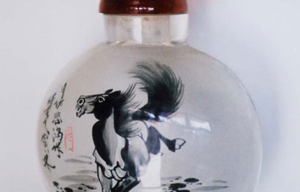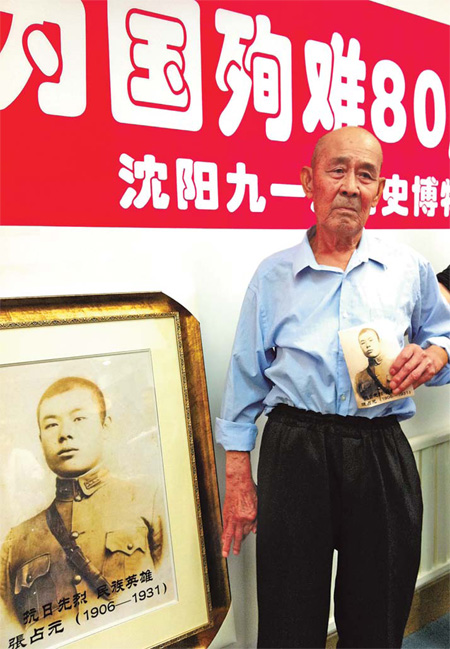People
Remembering a hero
Updated: 2011-09-20 08:02
By Liu Ce (China Daily)
|
Zhang Dianyuan holds and stands beside pictures of his brother, Zhang Zhanyuan, at a news conference held in Shenyang. [Wang Zhidong / for China Daily] |
Research reveals the identity of the first Chinese casualty of the 14-year War of Resistance against Japanese Aggression. Liu Ce reports.
The identification of the first martyr killed in the Sept 18 Incident of 1931, that marks the beginning of the Japanese military occupation of Northeast China, has enriched the archives of the Chinese people's 14-year-long resistance to the invasion, historians and researchers say.
Also known as the "Mukden Incident", it was a staged event that was engineered by Japanese military personnel as a pretext for invading the northern part of China, then known as Manchuria.
On Sept 18, 1931, Japanese troops destroyed a section of the railway owned by the Japanese in northern Shenyang (then Mukden) and, blaming it on the Chinese, attacked the Chinese garrison in the Beidaying area of the city that same night.
The events were followed by Japan's total occupation of China's northeast regions. As many as 35 million Chinese were killed or wounded by invading Japanese troops between 1931 and 1945.
Zhang Zhanyuan, commander of the 5th company of the troops of Northeast China's governor Zhang Xueliang, led his soldiers in an attack on the invading Japanese and was shot on Sept 18, 1931.
He was 25 years old.
According to records, Zhang was the first person killed in the counterattack against the Japanese army after the incident, researchers announced at a recent news conference held at the September 18 Historical Museum in Shenyang, capital of Northeast China's Liaoning province.
Zhan Hongge, a noted collector in Shenyang, discovered this historical fact.
Zhan says his wife had told him about Zhang Zhanyuan, the oldest brother of her grandfather. She said he was killed by the Japanese on Sept 18, 1931.
"When I collected material and information for the exhibition to mark the 80th anniversary of the Sept 18 Incident, the name Zhang Zhanyuan came up again," he says.
In the memoir, Mukden Incident Documentary, published in 1991, Zhao Mingyi, one of Zhang Zhanyuan's followers, recalled what happened that night.
"We were not allowed to fire at the Japanese planes in order to save the bullets for their ground troops. Zhang Zhanyuan, our commander, ordered me to skirt round the enemy position and I moved west.
"There were fewer enemy troops near the railway line. We went to attack them. Zhang led us in the surprise attack and was badly wounded during the battle. We attacked several times, but failed each time. We had to withdraw. Zhang died during the retreat.
"As far as I know, our company was the only one to attack the Japanese invaders that night."
Wang Jianxue, professor with the Liaoning Provincial Party School, says Zhang and his soldiers risked their lives to make that counterstrike.
He says the Sept 18 Incident was not only the start of the Japanese invasion but also of the Chinese people's resistance, which lasted 14 years instead of the eight years previously acknowledged. Officially, the War of Resistance against Japanese Aggression is considered to have lasted from 1937 to 1945.
Xing Ancheng, professor with Liaoning University counteracts this view, saying "14 years of the war of resistance" should be marked to restore the correct history.
Zhang Zhanyuan's younger brother, 89-year-old Zhang Dianyuan, told China Daily the story of the war hero.
"My family was in rural Shenyang and were farmers. There were eight kids and Zhang Zhanyuan, born in 1906, was the oldest. When he was killed, I was only 9 years old. He impressed me as a brave and forthright man," Zhang Dianyuan says.
In 1929, 23-year-old Zhanyuan graduated from Northeast Military Academy and reached the rank of lieutenant. He became commander of the 5th company of Zhang Xueliang's troops, the following year.
"On the day after the Sept 18 Incident, a soldier came to our home and told us that Zhanyuan had been killed by a bandit. He didn't tell us the truth because people did not dare to talk about the incident at that time," Zhang Dianyuan says.
He says his brother's 20-year-old wife was devastated by the news. She never married again and died in her 80s.
"Our parents thought this was a violent death, so they buried my brother near their home and not in our ancestral grave," he says. According to local custom, people who have an unexpected death cannot be buried with their ancestors.
"In 1933, after Zhang Xueliang's forces retreated to Beijing, we received a notice to participate in my brother's memorial in Beijing. Our father took my third elder brother, Zhang Puyuan, to Beijing secretly in case the Japanese found out about this."
There, the father was told the truth, that his son was killed while fighting the Japanese. Puyuan then stayed in Beijing and joined Zhang Xueliang's army.
"It's a pity that my brother didn't have a child and left us nothing to remember him by. The only memento was his photo in uniform at the Northeast Military Academy," Zhang Dianyuan says.
"This Sept 18 was his 80th memorial day. My grandson, Zhang He, struck the bell at the memorial ceremony for the Sept 18 Incident on behalf of our family.
"I hope the younger generation will never forget the humiliation and suffering for the country's prosperity. That's the best way to remember heroes."
E-paper

The snuff of dreams
Chinese collectors have discovered the value of beautiful bottles
Perils in relying on building boom
Fast forward to digital age
Bonds that tie China. UK
Specials

Let them eat cake
Cambridge University graduate develops thriving business selling cupcakes

A case is laid to rest
In 1937, a young woman'S body was found in beijing. paul french went searching for her killer

Banking on change
Leading economist says china must transform its growth model soon

